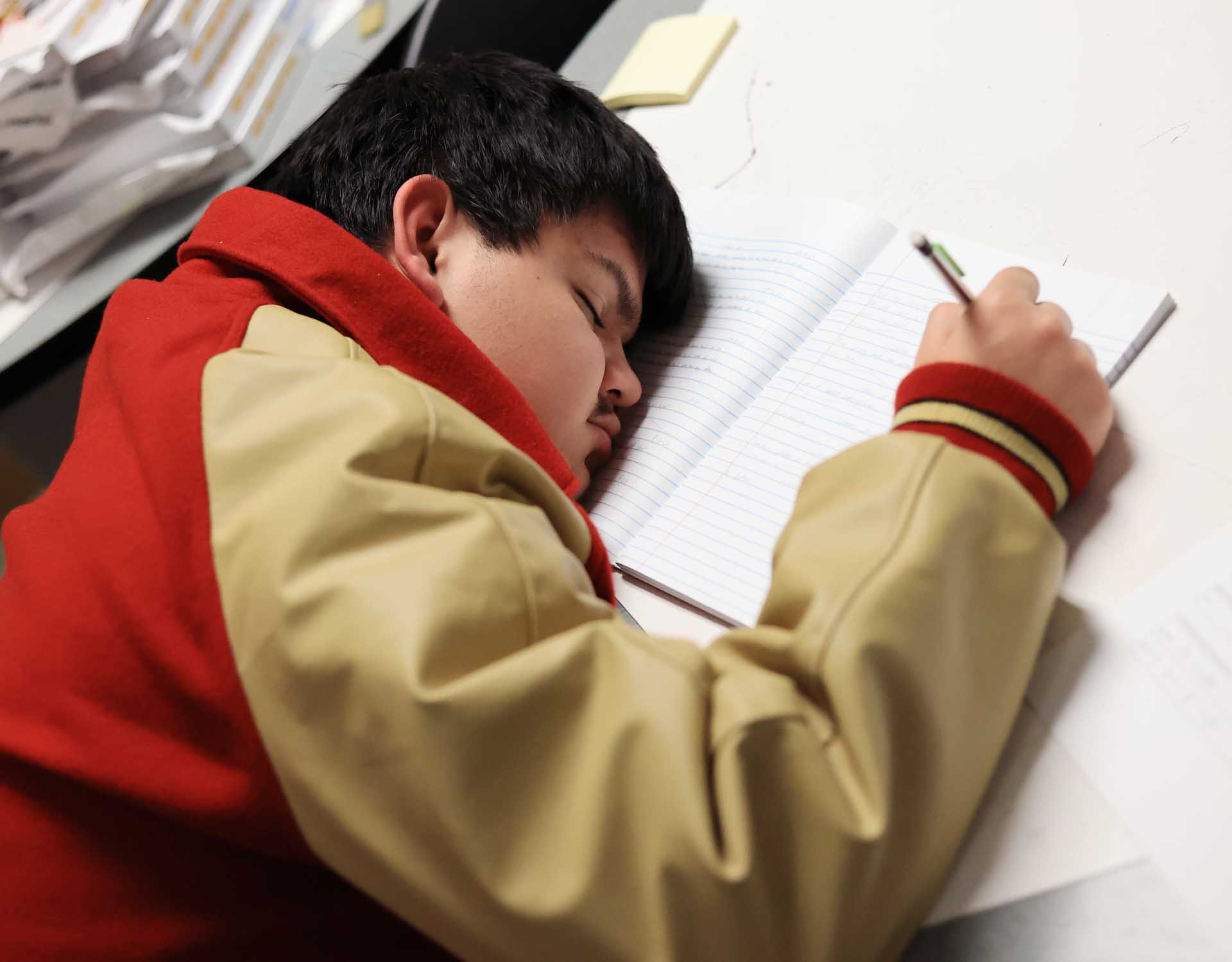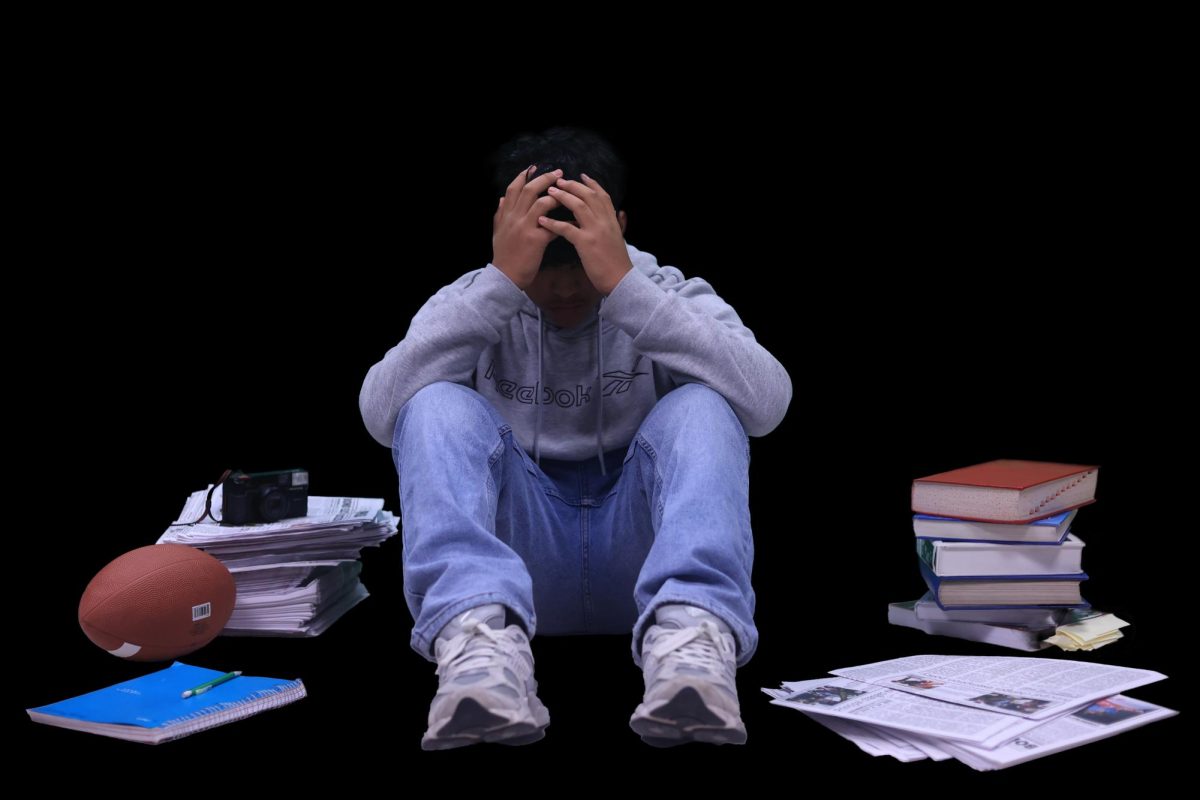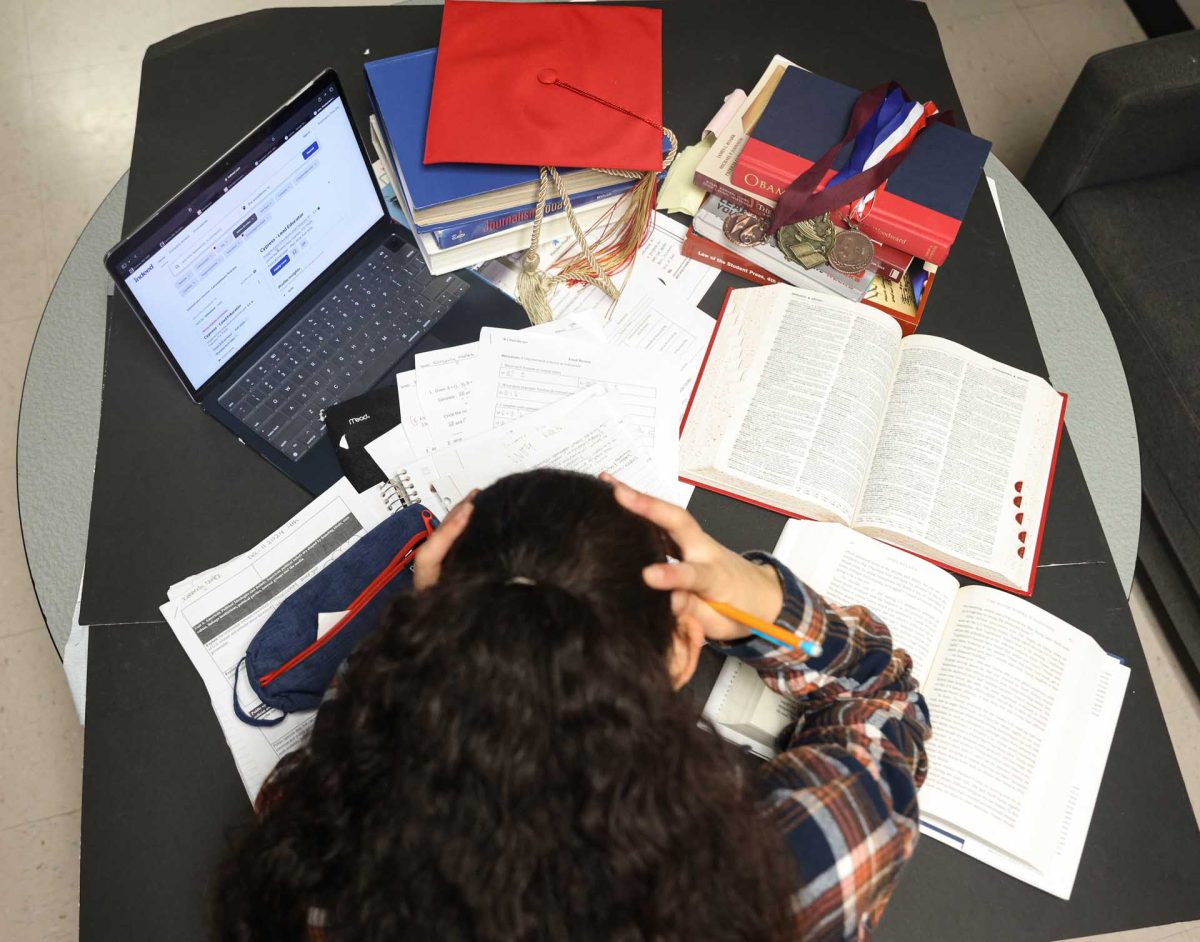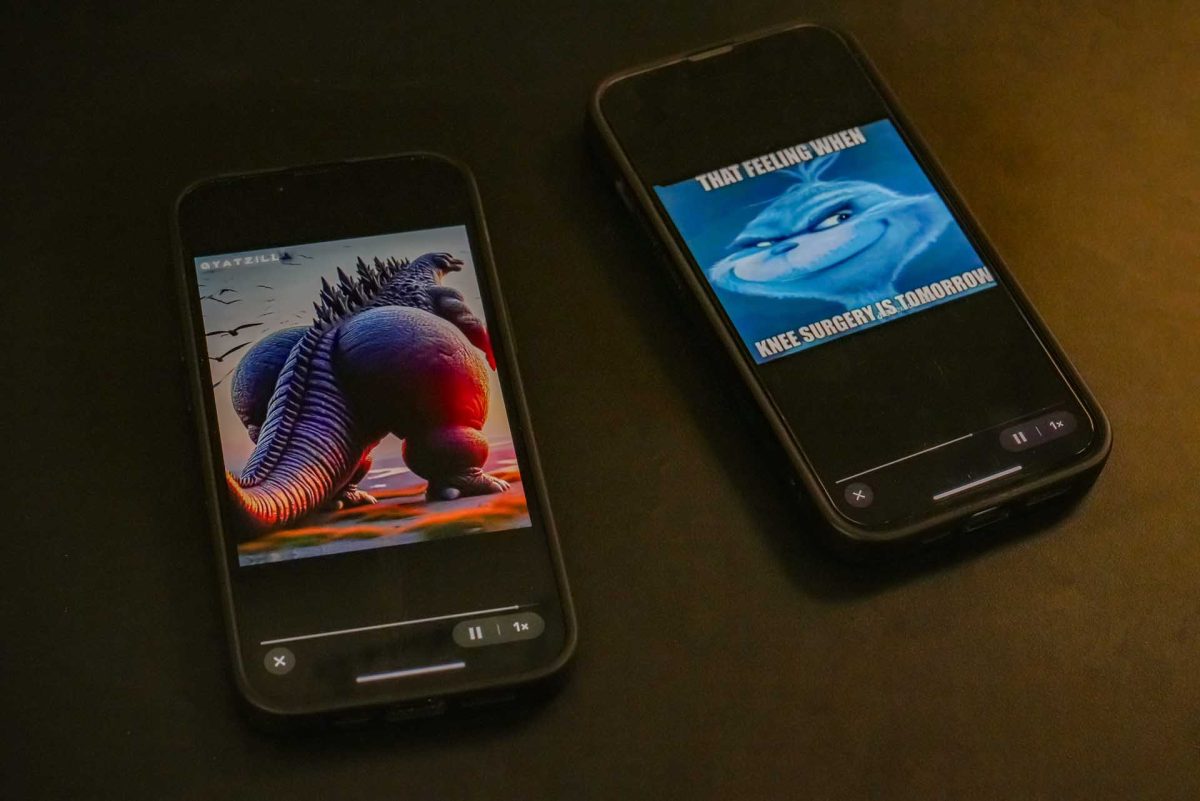Senior Jesus Mendez has a part-time job at Jack in the Box, so getting off work late is the norm.
“I’m just getting five hours of sleep,” Mendez said. “When I wake up I feel more tired and that causes me not being able to focus during school.”
He’s just tired. Neither Mendez nor the student body is getting enough sleep.
Mendez is one of the 52% of Caney Creek students who report getting only between four and five hours of sleep a night, according to Student Media’s Student Burnout Report. From juggling extracurriculars to holding down jobs, nothing mattered more to preventing burnout than sleep.
About 82% of students reported experiencing burnout this year. The survey asked roughly 475 students if they had experienced a feeling that met this definition of burnout:
Burnout is when you’re completely worn out, not just physically but also mentally and emotionally. You may feel super drained, unmotivated, and even a bit annoyed or “over it” with everything. Instead of just being tired, burnout makes you feel like you can’t keep going, and things that used to interest you feel like a chore. It’s like a constant state of hitting a wall where your energy and motivation are gone.
The second-biggest factor in reporting burnout was a student’s support system, particularly how comfortable they felt with their parents or guardians in times of stress.
SLEEP MATTERS
Statistical analysis from the survey showed not only a strong link between how rested students feel and burnout, but also the total number of hours and how much control they felt they had over their sleep schedule.
Students who feel they get enough sleep to perform well are significantly less likely to experience burnout. For each one-category improvement in their perception of sleep adequacy (say, moving from disagree to agree on ‘I get enough sleep to perform well in school’), (their initial risk) of burnout decreases by 51%.
For each additional category of sleep duration (e.g., moving from 4-5 hours to 6-7 hours), the odds of burnout decrease by 56%. However, if students feel their sleep is uncontrollable, the odds of burnout rise 68% for every step increase (e.g. moving from Strongly Disagree to Disagree that “Sleep is out of my control.”).
The report uses two hypothetical examples to illustrate how this might play out in real life:
Student A: After realizing how important sleep is, this student starts going to bed earlier. Instead of sleeping four to five hours at night, they sleep eight to nine hours. They have more control over their rest by creating a consistent sleep schedule, lowering stress levels. Because of this, their risk of burnout drops from 93% to 40%.
Student B: Due to a lot of academic pressure, this student’s sleep duration drops from eight to nine hours, to zero to three hours. They feel like they have no control over their sleeping schedule. Their risk of burnout rises from 40% to 97%.
Mendez, for example, relates more to Student B.
“I get off work during the week at 11:30 p.m., get home at midnight and shower,” he said. “I usually go to sleep at 1 a.m. and it’s like four or five hours that I sleep and in the morning I feel like I’m sleepy and I just don’t have energy.”
According to the Centers for Disease Control and Prevention and the Mayo Clinic, 13-18-year-olds are recommended to sleep between eight and 10 hours a night. When students are tired, it’s hard to focus and retain information, making school work even more overwhelming according to the learning counsel. Sleep deprivation can lead to increased stress and anxiety, making them more irritated to cope with everyday challenges.
Since 2007, the CDC has administered the Youth Risk Behavior Survey that looks at things affecting high school students, including sleep. Insufficient sleep spiked nationally from a 2013 low of 68% of students to 77% in 2023. At Caney Creek, that number was 90%.
“When students don’t get enough sleep — especially less than six hours a night — or feel powerless to improve their sleep habits, their risk of burnout skyrockets,” the Student Media report noted.
Girls (80%) were consistently affected more than boys (75%). The Student Media report also found that girls were 165% more likely than boys to report burnout and 32% more likely to report getting less sleep.
Sometimes for Mendez, class means catching up on sleep.
“I was working for four days straight,” Mendez said. “When I woke up that Monday morning I felt really exhausted from all the standing from work that I was falling asleep in class. … On my days off work, all I do is catch up on my sleep. It helps a lot, especially feeling less tired during the day.”
Parents can encourage a bedtime on weekdays, and also weekends to help children’s sleep schedule, according to the CDC. Schools should bring awareness to sleeping disorders such as insomnia, and educate students on the dangers of sleep deprivation.
“I feel like instead of teachers getting mad at students falling asleep they should understand,” Mendez said.
To improve sleep, having a healthy sleep routine – going to sleep and waking up at the same time daily – can benefit students. Students may also find better sleep through physical activity, avoidance of caffeine, and having a nightly routine.
“My nightly routine is I shower before going to bed,” Mendez said. “It helps me relax my body and I feel like I can sleep better.”
HIGHER FAMILY & SUPPORT SYSTEMS REDUCE BURNOUT
The second-biggest factor affecting burnout was
Pressure from families can be overwhelming for students, depending significantly on how students perceive family. Higher levels of family pressure consistently increased the odds of burnout by 46% to 53% as family expectations as positive were 42% less likely to report burnout.
SCENARIOS FROM THE SURVEY
Student A: Feels family pressure “Rarely” but moves to “Always” would see their probability of reporting burnout rise from 45.9% to 64.8%, if this student shifted their perception from “Mostly Negative” to “Mostly Positive”, reducing their probability of burnout from 64.8% to 21.9%.
Student B: Who experiences a decrease in family pressure from “Always” to “Rarely” is about 50% less likely to report burnout.
MENTAL HEALTH REDUCES SLEEP
Two factors had an indirect effect on burnout by reducing the chances students get sleep. One was having any mental health condition such as bipolar disorder, ADHD or depression, or learning disability such as dyslexia.
According to the Student Media survey, students with mental health or learning challenges are 54% more likely to report shorter sleep durations.
“This lack of adequate sleep translates to a heightened risk of burnout, as insufficient sleep significantly increases the odds,” the report notes. “While mental health status is not, itself, a predictor of burnout, it’s status as a predictor of poor sleep means that it has a cascading effect — mental health leads to poor sleep, which leads to burnout.”
SCENARIOS FROM THE SURVEY
Student A: Has mental health challenges and gets 6-7 hours of sleep and starts with a 50% risk of burnout. Their sleep drops to 4-5 hours of sleep and their burnout risk jumps to 78%.
Student B: Does not have any mental health challenges, gets the same amount of sleep as student A and starts with a risk of burnout of 30% it increases by 47%.
Student C: Has mental health challenges starts with a 50% risk of burnout and gets 6-7 hours of sleep but tries to improve their sleep to 8-9 hours their burnout risk decreases to 32%.
Student D: Does not have mental health challenges, starts with a 30% risk of burnout and improves their sleep from 6-7 hours to 8-9 hours their burnout risk drops to 19%.
In these scenarios, senior Jamie Bonilla feels the struggles Student A faces.
“I struggle at times with my mental health and I don’t get enough sleep,” Bonilla said. “It causes me to lose focus in school and fall behind in work, making me stressed out, my grades dropping and feeling exhausted to do simple tasks.”
LACKING TIME MANAGEMENT ALSO REDUCES SLEEP
Having confidence in time management skills showed a strong link to both burnout and increasing how many hours a student sleeps on average, according to the Student Media survey.
Students were asked to rate the sentence “I have good time management skills.” on a scale from strongly disagree to strongly agree. The same was true of the statements “Someone taught me time management skills.” and “It is the school’s responsibility to teach me time management skills.”
Students who feel they have good time management skills:
- 29% less likely to report feeling burnout for every increase in confidence
- 41% more likely to sleep longer for every increase in confidence
The more a student says they were explicitly taught time management, they are:
- 175% more likely to feel they have stronger time management skills
- 33% more likely to sleep longer
- 56% more likely to believe schools are responsible for teaching it
Having multiple extracurricular activities and working longer hours at a job both made students 17% and 13% less likely to have good time management skills.
TECH TIME
School districts across the country, including Conroe ISD have begun to crack down on cellphone use because of several studies linking overuse to mental health problems like depression.
However, the Student Media report showed that when it comes to time management, technology played both a positive and negative role depending on how the student intends to use their device.
While owning a cellphone was beneficial, using technology to avoid tasks and overusing it negatively impacted confidence:
Owning a cellphone was associated with a 487% improvement in time management confidence. This suggests that access to a cellphone, which can serve as a tool for organization and planning, has a substantial positive influence.
Students who reported using their phones explicitly to take a break from stress had no effect on time management confidence, suggesting that proper time, place and manner of use can be, at best, a mitigating factor and, at worse, not an issue.
Spending longer periods avoiding tasks on technology was linked to a 22% reduction in confidence, showing that prolonged distractions further undermine time management. Students who felt guilty or stressed after using technology to avoid tasks experienced a 26% reduction in time management confidence.
Time management appears to have a healing effect on avoiding tasks as well. Students who had higher time management skills were 34% less likely to use technology to avoid tasks and, when they did, spent 26% less time doing so.
“Interestingly, time management skills and being explicitly taught time management decrease the likelihood a student chooses to avoid tasks with technology,” the report notes. “However, neither significantly affected the amount of time spent when you factor time management skills and training together. This suggests that while the skills and teaching is important to spending less time avoiding tasks with technology, they are bigger factors in preventing them from avoiding tasks in the first place.”
Students using technology to hide from responsibilities also led to an 76% increase in feeling guilty after. About 20% of all students reported both using technology to avoid tasks often or always and often or always feeling guilty about it.









